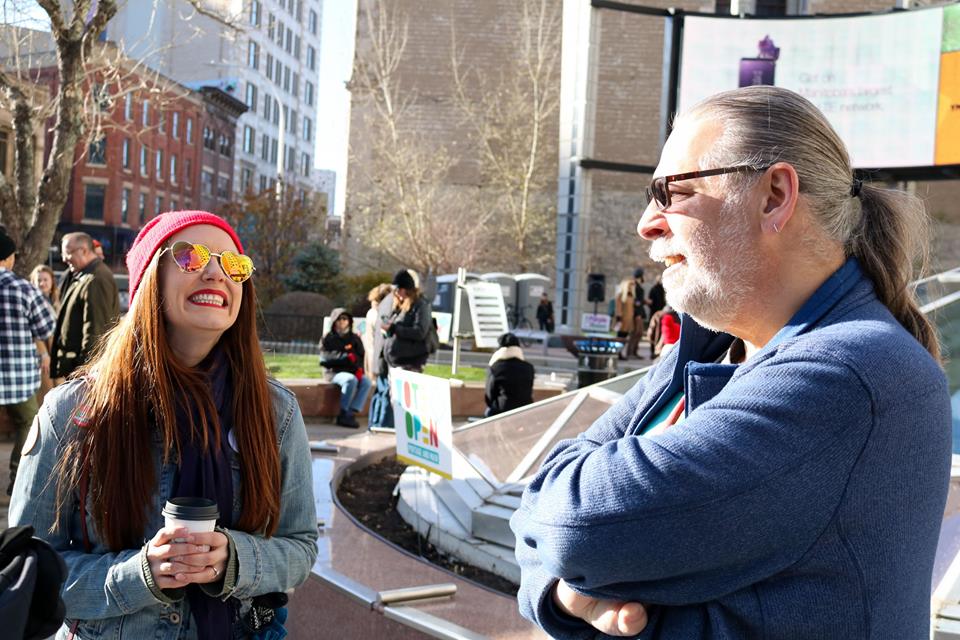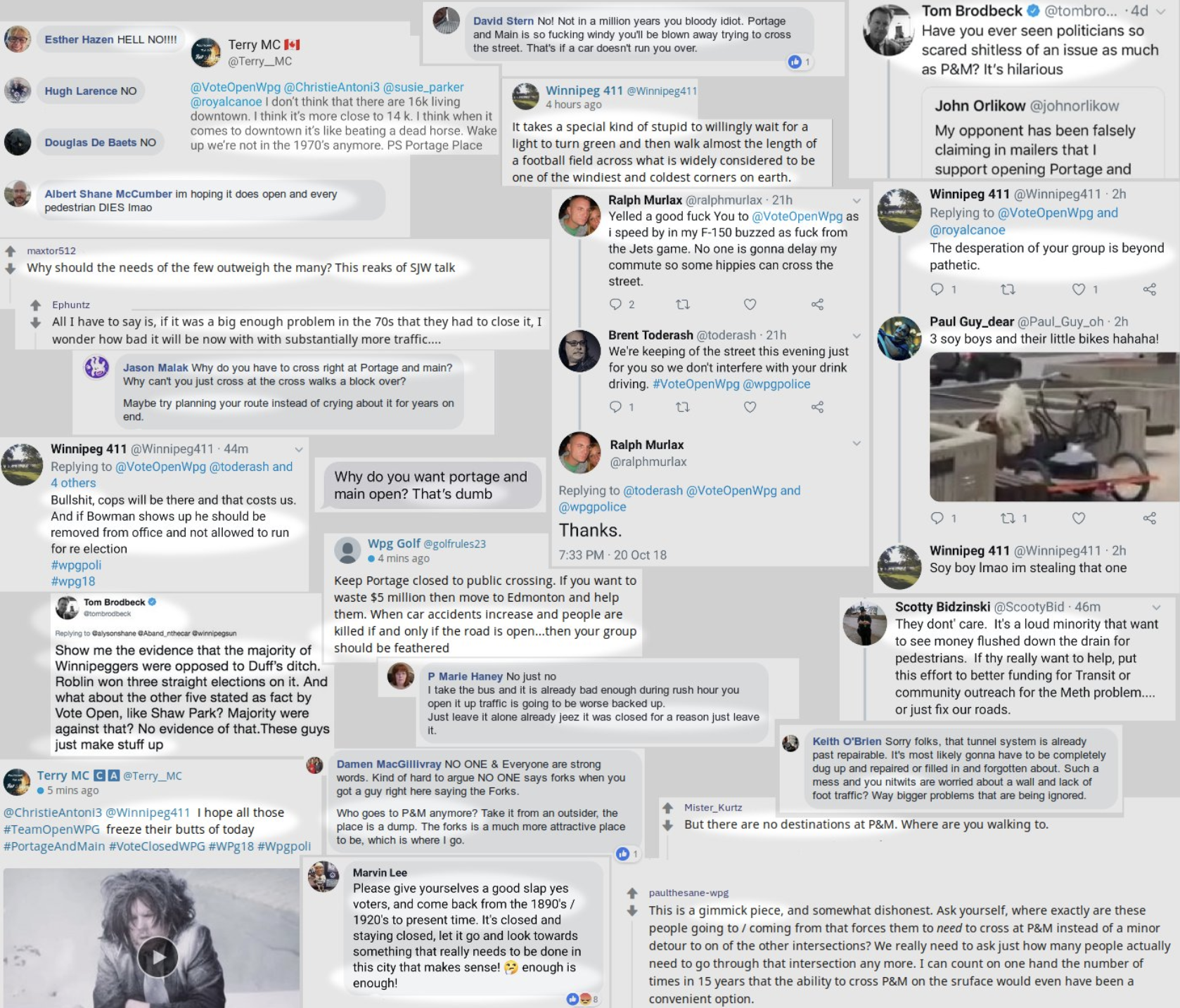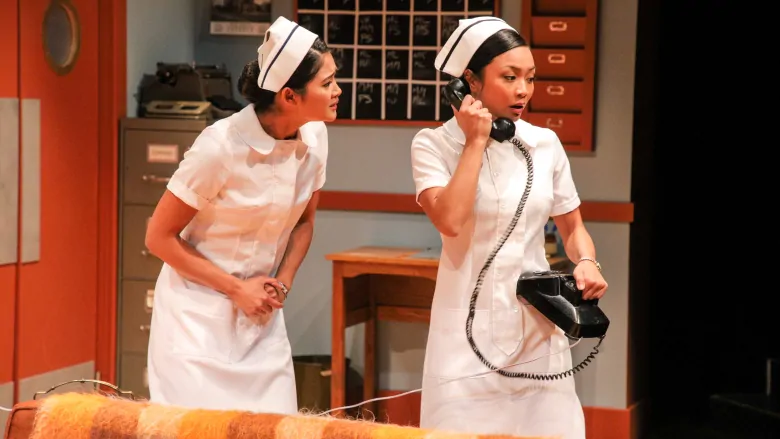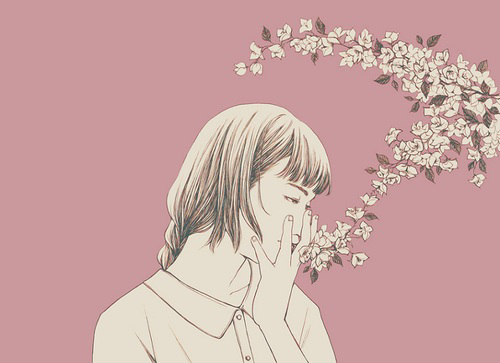October 2018
The election is over so I can use the internet again
- by Alyson Shane
Just kidding, I never stopped using the internet.
But in the weeks leading up to the election I found myself dreading looking at social media, and at the deluge of inflammatory comments, straw man arguments, and overall negativity aimed at the Coalition for Portage and Main (aka 'VoteOpen') of which I was a spokesperson during the recent election.
I'm going to talk about that experience as frankly as I can because that's what I've always tried to do. Maybe this will hurt your feelings. Maybe this will piss you off. Maybe you'll agree with me. Maybe some of this will ring true to you.
Who knows.
Here goes.

The Good
As a member of VoteOpen I got to know some of the most passionate and dedicated people I've ever met.
As a business owner I have the privilege of regularly meeting interesting and motivated people as part of what I do, but it's not often that I've had the good fortune to be in a room with so many people who fit that bill on an ongoing basis.
The VoteOpen committee meetings each Friday afternoon became one of the highlights of my week (especially the post-meeting cocktails). I got to know smart and thoughtful people like Adam Dooley, Ian McCausland, Anders Swanson, Wil Belford, Glen fucking Murray, Adam Duguay, Brent Bellamy, and a whole lot more who brought creativity and great ideas to every meeting.
I met dozens of volunteers who weren't on the committee, but who donated time on evenings, weekends, and during their workdays to advocate for a cause they believed in.
I spoke to passionate Winnipeggers on a daily basis who believe that the best downtowns are accessible, pedestrian-focused, and who share the same vision of my city as I do.
I got to be on podcasts, on the radio, and on the news multiple times as a spokesperson, which sharpened my chops and helped me become a more confident public speaker.
I tabled at my alma mater and got to engage with university students about the civic process, and talk to them about the kind of city they want to live in.
I gave a talk at Design Winnipeg's 10x20x20 where people cheered for our message.
That one felt good.
A local "journalist" (heavy quotations) blocked me on Twitter after I repeatedly asked him why he was going after a group of volunteers instead of holding City Hall accountable for keeping the public uninformed about the impact of the plebiscite vote.
Instead of explaining his reasons, he blocked me.
Does that one get me a badge? I feel like it should.
Then, near the end of it all, I got to attend OpenFest, a free public concert where my favourite local band played my favourite song in support of a cause I believe in, and which I campaigned for.
That was a really good night.
The Bad
At the end of the day, the city voted 2-to-1 to keep the intersection closed. Obviously I'm disappointed with the outcome; how could I not be, really?
But the thing that disappointed me the most was how little our elected officials did to keep the public informed about an issue that will continue to shape the future of our downtown.
Instead of leading the discussion, our Mayor (who initially campaigned on reopening the intersection, by the way) and City Council left it to a group of volunteers to try and do their work for them.
This would have been a great moment for the incumbent (and now second-term) mayor to lead the discussion and showcase the vision of the 'City of a Million' he led with during his initial bid for mayor back in 2014.
It would also have been a great opportunity for City Council members to - at the very least - make the information regarding the Portage & Main more readily available and understandable so the people living in their wards could make informed decisions about the future of the city they live in.
Unfortunately that would require some vision and consideration for their electorate, neither of which I've seen around City Hall recently.
Dan Lett wrote a wonderful piece in the Winnipeg Free Press articulating what a farce this entire plebiscite vote was, so I won't repeat it here, but suffice it to say we were fighting an uphill battle from the start, and one that was deliberately stacked against people who support and believe in our downtown.
Honestly though, the worst part was watching my city turn its back on progress.
As a recent New York Times article pointed out, all over Canada and elsewhere cities are revamping their downtowns to focus on pedestrian foot traffic, transit and cycling infrastructure, and business development to reinvigorate decaying downtowns and wean ourselves off of our dependance on single-person vehicles and fossil fuel.
Except here in Winnipeg.
In Winnipeg, the car is still king, even though it shouldn't be.
**Edit**
(Don't give me any blowback about the "cold winters," please. I've lived in this city for most of my life and I've never owned a car. I walk or bike when it's warm enough [which is actually most of the year] and in the winter I take transit, or a Tapp Car, and I get by just fine. So do many other people I know. So that excuse is moot as far as I'm concerned.)
The Ugly
One of the most frustrating parts of this experience has been the repeated accusations and insults hurled at a group of people who are volunteering their time to try and effect positive change for our city.
I repeat: we were volunteers with no political experience doing the best we could with limited time, resources, and information.
We did our best to convey information from sources like 90-page reports, documentation about local transit, etc. in a succinct and effective manner, but that shit is hard, and doubly so when the majority of "no" voters we engaged with continued to accuse us of deliberately trying to mislead the public, or of "not providing them with enough information."
Because here's the thing: we had all the same information as everyone else in this city. We just took the time to read through it all (or most of it) while the majority of voters decided not to.
(And if you didn't, that's fine. But people in glass houses shouldn't throw stones.)
Specifically, however, I want to touch on a troubling component of this campaign, which is that the VoteOpen folks were held to a significantly higher moral standard than the "no" side and our local politicians.
A local politician called us "elitists" (which is laughable - I rent my home and don't own a car. I'm hardly "elite" by anyone's standards), our local smear "journalist" called us "arrogant," and I've had more people accuse us of being condescending or of "talking down to people" than I've ever heard in my life.
(And I grew up in an abusive household, so I know what it feels like to be talked down to, or to be made to feel small or stupid on purpose.)
I helped manage the VoteOpen social accounts, so I can say with certainty that we always strove to be respectful in our messaging, and to rely on facts and data whenever possible while also trying to paint a picture of what our downtown could be.
However, the one talking point that seemed to really incense people is this:
The general public are not informed enough to vote directly on matters of public policy.
This one confused me, because here's the thing: it's OK to be uninformed.
Being "uninformed" doesn't mean someone is stupid - which is what a lot of people seem to think it means for some reason - it means we haven't learned as much about a subject as we could, and that's totally okay.
But the impact public policy projects - from The Forks, to The MTS Centre, to The Floodway (aka "Duff's Ditch"), just to name a few local ones - is hard to convey because it's hard to get people to think "big picture" at a civic and multigenerational level if they've never had to before. And that's okay. We all start somewhere (and I can say this from experience).
That's why VoteOpen consistently linked to relevant data, facts, and opinion pieces from urban planners who spend their lives studying the effects of areas like Portage & Main whenever we could.
We did this not to make other people feel small, but because we were trying to avoid getting into rhetorical arguments, or from using logical fallacies whenever possible.
We stuck to the facts whenever we could because the facts are how we make informed decisions, both in our personal and public lives.
The "no" side, however chose to hurl insults at us, leave negative or rude comments, or tell us that they hope people die if the intersection is reopened.
Here's a small sampling:

These two stand out:
"When car accidents increase and people are killed if and only if the road is open... then your group should be feathered."
and
"Im hoping it does open and every pedestrian DIES lmao"
I heard this sentiment a lot: people commenting and saying they hope people die so VoteOpen will "learn a lesson" or that they can't wait to see the bodies at Portage & Main.
What the actual fuck, people. These kinds of attitudes and comments are extremely alarming. Would you want to live in a city where people think this way about you?
But my point is that we were repeatedly dragged over the coals for engaging in what was always intended to be respectful and civil public discourse, while the "no" side had a field day and wasn't held to the same moral standard.
We weren't perfect, of course - this was an emotional election and both sides got worked up - but I can say with certainty that everyone officially associated with VoteOpen always did their best to be respectful to everyone we engaged with.
I know from experience that that wasn't the case on the other side of the aisle, and seeing such an ugly and repulsive side of my city really started to wear me out as the campaign dragged on.
Moving Forward
Despite the result of the plebiscite (which is non-binding, by the way) I doubt that the discussion about Portage & Main is over.
We already know that millions still need to be spent to repair the underground concourse, which is infested with mold and decaying (as concrete tends to do after 40 years) so the barricades will come down anyway... and frankly it seems stupid and small-minded to simply put them back up again after we spent millions taking them down.
I guess we'll see.
At the outset of this whole debacle I said that the Portage & Main debate is an embarrassment to Winnipeg, and even after being called "arrogant" I still stand by that statement.
It was embarrassing to have to work so hard just to try and get people to say "yes" to opening an intersection.
It was embarrassing to hear people in my city dismiss people with accessibility issues who stated that the intersection didn't let them cross the street with dignity.
It was embarrassing to hear people make fun of and dismiss women who expressed concern for their safety while navigating the underground concourse alone or at night.
I felt embarrassed of my city when I spoke to individuals from elsewhere who didn't understand why people were fighting to keep people from crossing the street.
The most embarrassing part was seeing firsthand that many people who live in this city don't care about the health and well-being of the place we call 'home' if it affects their commute in any way whatsoever.
Actually, that was equal parts depressing and embarrassing.
Our downtown deserves better than to be a thoroughfare between one suburb and the next.
Still Feeling Hopeful
Despite all of the negativity, what this experience taught me was that the tides are changing in my city. Things are changing slowly, and from the centre out (as is typically the case with cities, it seems), but things are changing.
This is especially true among the younger demographic, who are spending more and more time downtown, and in the surrounding areas like The Exchange District and The Forks.
When tabling at the University of Winnipeg the majority of the students I talked to were open to the idea of a walkable and vibrant downtown, and saw Portage & Main as a key point to making that happen because they wanted a city that they could be proud of.
That was inspiring.
Because here's the thing: you can't stop progress.
Sure, you can slow it down. You can try and get in the way. But progress always wins out because eventually people will want to start replicating the success stories we see and read about in other North American cities.
Hopefully we can get some real leadership and vision in City Hall sooner than later, and the next round of politicians in the civic election will do a more effective job of communicating a vision of the kind of vibrant, safe, and accessible downtown that we and future generations deserve to be able to enjoy and experience.
Winnipeg will get there, eventually.
And I, for one, am happy to keep leading the charge for progress.
See you around, Winnipeg.
Saw Prairie Nurse at the Prairie Theatre Exchange last week
- by Alyson Shane

(Photo via Leif Norman)
It's a weird, funny screwball comedy and if you're looking to have an excuse to forget all the weird, messed-up stuff happening in the world right now and have a couple of good belly laughs, then this is the play for you.
I typically try not to do any preliminary research before going to a play at the PTE so I can go in without any expectations, and to date I continue to be pleasantly surprised by the quality of the plays, storytelling, and acting brought to life onstage each season.
The first thing that stood out to me when we sat down for Prairie Nurse was the set: usually plays at the Prairie Theatre Exchange (in my experience, anyway) tend to have more stripped-down sets, and rely on the audience's imagination to fill in the blanks.
Not that I'm complaining, mind you. I enjoyed the set a lot; in particular the lockers and the Formica table set gave everything a weird, home-y feeling. Even though the set was intended to represent the hospital staff room, it did a great job of conveying that this was the space were the characters "lived" when not working in the hospital. I loved it.
The play starts with several of the staff at a hospital in rural Saskatchewan anxiously awaiting the arrival of two new nurses who are moving to Canada from The Philippines.
The plot felt especially pertinent given than Winnipeg is home to one of the largest and most established Filipino populations in Canada, but even though the play tackles a lot of quirks and assumptions that can occur when different cultures clash for the first time, the play does a great job of speaking to anyone who has ever felt misunderstood, or out of place.
The plot of the play follows Puring (short for Purificacion) and Penny (for Indepencia), two women from the Philippines who come to a small-town Saskatchewan hospital to work as nurses during the 1960s.
The recurring problem that the hospital staff have, and what ultimately proves to be one of the major plot devices as well as one of the primary recurring jokes, can't tell the two nurses apart.
Of course, this inability by the hospital staff to tell the new nurses apart results in a variety of silly hijinks
(side note: so happy to finally have an excuse to use the word 'hijinks' in a written sentence on my blog)
which are only enhanced by the slapstick-style action of people entering through one door while someone exits another, jokes about how cold Canada is (of course), mispronunciations, and a variety of other jokes that I won't go into here for fear of spoilers.
One thing that stood out was how quietly the play addressed different, more subtle forms of racism. For example the hospital staff have a hard time telling the conservative and shy Puring, who comes from a rural community, apart from the outgoing Penny, who hails from Manila and has a decidedly more... shall we say, entitled personality.
One of the best characters was actually a supporting one: Dr. McGreggor, a Scottish doctor so obsessed with hunting and fishing that he'd pretty much rather be anywhere else than in the hospital delivering babies and tending to patients.
Overall Prairie Nurse was a charming and touching story not just of overcoming cultural differences, but also of the very human experience of trying to fit into a new place, and or trying to adapt to a changing one.
Prairie Nurse was a really lovely way to kickoff the 2018/2019 play season. I'm excited to see what the Prairie Theatre Exchange does next!
It's been a weird, hard time lately
- by Alyson Shane

I don't know but whatever it is, it's been a weird few weeks and it's not just me. Everyone seems to be going through one thing or another.
There's a weird crackle in the air, bad juju, bad luck, weird happenstance, odd off-putting stuff going on it seems. A conflict. A misunderstanding. Health issues. Mental problems.
Everything feels fucked in one way or another and it's hard not to let it eat at you. Wear you down. Make you feel like what's the fucking point
of anything at all.
Between politics and the planet and interpersonal bullshit I swear every person I know is struggling somehow and I'm not sure if this is what adulthood is supposed to be like
or if this is just the new normal we all get to deal with
or if this is just how we get to feel if we take the time to be a #wokebae in today's messed-up, backwards-slipping world
but whatever it is, it sucks.
And I'm ready for a break.
But being a #wokebae (which is a joke, you guys) is realizing that - goddamn it - if nobody gives a meaningful shit then nothing will get better.
So you wake up and swallow yr feelings and slap a smile on yr face and pretend like, yeah everything's great I'm just overwhelmed because a major world power just elected a guy who committed sexual assault to the highest court in the land
and yeah the president of that same country made fun of victims of sexual assault and people thought that was OK
and the planet continues to be fucked and we're making it worse and what am I supposed to tell my future child about how we messed the planet up for them
and yeah people in this city can't vote "yes" on what should be an easy "yes" and essentially a non-issue
and people continue to be the versions of themselves that they are instead of the ones you wish they were
and all the other ways I and so many other people around me have felt like we're failing ourselves, or others, or both. And pretend like
yeah it's fine.
But it's not fucking fine, is it?
(Tell me it isn't.)
